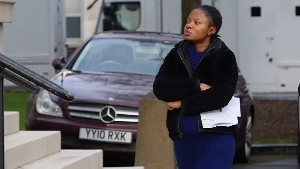Following the notion that the voice of the people is the voice of God, I decided to abstain from any discussion of the Indemnity Clause, because many Ghanaians seem comfortable with it. I changed when President Mills boldly convened the Constitutional Review Commission (CRC) to review the 1992 Constitution and advise the Government on parts that need revision or rethinking. I was elated, not only because the CRC was convened under the leadership of the eminent, respectable, and iconic Professor Fiadjoe, but also because I had no doubt that the recommendations would be of the highest quality. Nevertheless, given the adage that no human construct is absolutely fool-proof, I suggested in my Ghanaweb article, "*Expunge the Indemnity Clause*,” dated October 4, 2010, that we should withhold crediting the President for the initiative and applaud him, his Government, and the CRC only after seeing the final outcome of the CRC report and finding that to be objective and plausible
Last year, Ghanaweb announced that the CRC had submitted its recommendation to the Government. While awaiting the Government's action on the recommendations, it was reported yesterday that Professor Fiadjoe, at a workshop, has commented that it would be a bad idea to expunge the Indemnity Clause. The report gave no glimpse as to whether the comment reflected the gist of the Committee's findings and recommendations. While we may not have an answer for this question, we may wonder whether the Chairman’s comment was appropriate where it so firmly and conclusively dilated on a matter that is awaiting Government’s action or reaction.
An even bigger problem with the comment is it's substantive import. Specifically, the Chairman opined that expunging the Indemnity Clause would create chaos by illegalizing all military governments that the country has had, the N.L.C. the N.R.C., the S.M.C, the N.D.C., and the PNDC.
While all constitutions abhor and illegalize coup d' etats, coups are not illegal merely because the pre-existing constitutions rightly forbid them. Instead, notwithstanding unequivocal constitutional provisions to the contrary, a coup is legal if it succeeds, and illegal if it is foiled. Thus, notwithstanding the provisions of articles 1(2) of the 1972 Constitution, which was a verbatim reproduction of the 1969 counterpart forbidding overthrow of a constitutional government, the coups of the NRC in 1972 and NDC in 1979, etc., were legal and accorded international recognition under established principles of law because they were effective. On the other hand, because the foiled coups were inefficacious, not only did they fail to get international recognition, but also their illegality formed the basis for the execution of the leaders, Arthur and Yeboah, for example, as traitors.
Because the 1966, the 1972', the 1979, and 1980 coups were legal, they are so indelibly etched in our history that nothing can reverse their significance. Thus, contrary to the Chairman’s comment, expunging the Indemnity Clause would thus not invalidate any of these regimes.
The point that we are failing to recognize is that expungement of the Clause would affect only illegal things that might have been done by the Governments established by the coups. Here, we should note that, when a coup succeeds, the laws pertaining to revolutions apply. As expounded by jurisprudential luminary Hans Kelson, and replayed in several landmark cases in Uganda (*ex pate Matovo*), Ghana (*re Akoto*, *re Okine*, *Sallah*), Nigeria (Lakanmi), and Pakistan (*State v. Dosso*, a successful coup d'état supplants the preexisting legal system, including the Constitution, a.k.a the grundnorm, and establishes its own. The grundnorms of coup d'états are the Establishment Proclamation Decrees that the coup leaders promulgate. While such Proclamations preserve aspects of the overthrown systems (*see,* *e.g.,* *Sallah*), they also form the basis upon which the new leaders rule by decrees. The coup leaders are very powerful in that they can make whatever laws they deem appropriate. However, they are not above the law and, like every one else, they are governed by the Grundnorms and decrees. Anything they do in excess of these laws can be challenged and invalidated, if not under their regimes, at least, under those which come after them. Governmental acts that violate the peoples' fundamental rights and rights to due process by seizing properties without any legal backing, selling or sharing government properties among friends and businesses; incarcerating or killing people; or even tampering with powers of traditional authorities, fall into this category of challengeable excesses. The clamour to expunge the Clause is to recognize the illegality of such excesses and redress and / or appease the victims and their families. These recognition and appeasement can be done by apologizing to the victims, returning to them what have been unlawfully taken, or, if impossible to do so, paying them reparation. In case of misappropriated state properties, the expungement of the Clause would pave the way for the government to recoup those properties, by among other means, using the doctrine of constructive trust. Let me be clear, the excesses at issue here are what were done after the coups succeeded, not those incidental to the hatching of the coups. Thus, with all due respect, I submit that Professor Fiadjoe’s comment is misleading, wrong, and premature, where, in addition to seemingly upstaging the Government by preempting the Government's action on the Submitted recommendations, it suggests that the expungement of the Clause would illegalize all the coup d' etats and all things done thereunder. I repeat, neither the coup d' etats nor acts done in keeping with their grundnorms are reversible: what would be reversed via the expungement are solely the acts that exceed the bounds of the laws. e
The view that the retention of the Indemnity Clause would foster stability is likewise untenable and, to say the least, a contradiction in terms. Given that coup that succeed are legitimate, the stripping of the Clause seems to be the only potent vehicle for holding coup leaders accountable for their excesses. Specifically, if the Indemnity Clause is kept intact, any coup architect may be undeterred. Instead, that person would be attracted by Clause. We cannot entertain such vulnerability. Nor should we allow indemnity clauses to be used as templates for overthrowing our elected governments.
Fellow countrymen and women, as you all know, coup d’états destabilize the beleaguered political systems, intensely putting the developmental clocks back for years. Moreover, they are antithetical to the ideals of freedom and democracy. Accordingly, we should be worthy stewards of this blessed country; do everything to promote loyalty to the country; love and tolerate one another; eschew the winner-takes-all attitude, and discourage assumption of power by extra-unconstitutional means. It would seem to make sense if we also desist from commenting on the Clause at least until after we see or hear how the Government responds to the CRC recommendations.
By Nii Otu Quaye
Opinions of Saturday, 18 August 2012
Columnist: Quaye, Nii Otu














